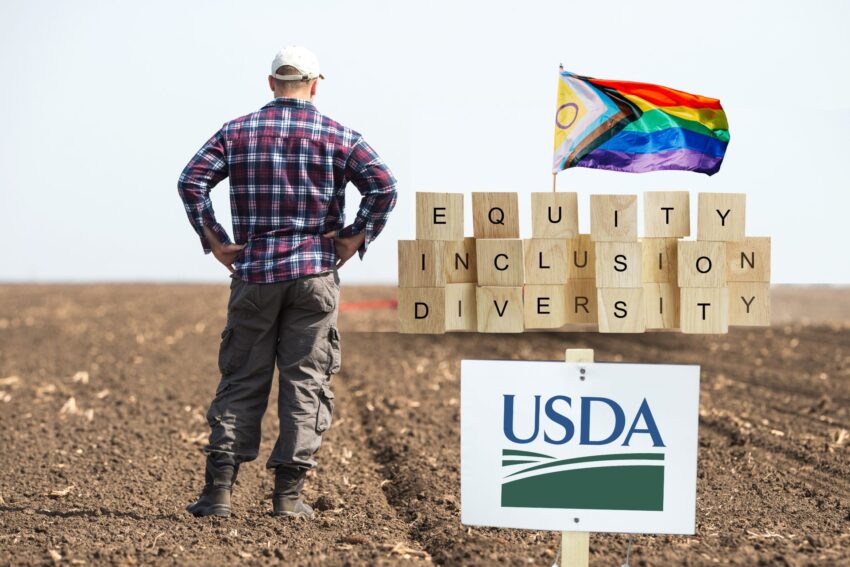Under the Biden administration, the U.S. Department of Agriculture (USDA) veered off its well-trodden path of supporting farmers, ranchers, and rural America, plunging instead into a bizarre world of “social justice” and Diversity, Equity, and Inclusion (DEI) programs. These initiatives, often funded with eyebrow-raising sums of taxpayer money, ranged from the perplexing to the downright nonsensical, bearing little connection to the agency’s core mission of advancing American agriculture. By prioritizing ideological agendas over practical support, the USDA squandered resources and undermined its credibility, paving the way for budget cuts—some driven by Elon Musk’s efficiency crusade—that may now threaten even its most valuable programs.
A Mission Hijacked by Ideology
The USDA’s mandate is rooted in the gritty realities of agriculture: ensuring food security, boosting rural economies, and equipping farmers with the tools to thrive. Yet, during the Biden years, the agency seemed more enamored with progressive buzzwords than with the needs of its constituents. As reported by ZeroHedge on March 31, 2025, the USDA funneled hundreds of thousands of dollars into studies and programs that defy any agricultural rationale, including a $300,000 grant to explore “Queer Farmers” and “Latinx masculinity” in farming (ZeroHedge, “USDA Paid To Study ‘Queer Farmers,’ ‘Latinx Masculinity’ & More On The Taxpayer Dime“). Meanwhile, farmers faced soaring fertilizer prices, labor shortages, and devastating weather events—challenges that demanded concrete solutions, not academic navel-gazing.
The agency didn’t stop there. It established a Chief Diversity and Inclusion Office and rolled out an ambitious Diversity, Equity, Inclusion, and Accessibility Strategic Plan, complete with a small army of consultants and contracts reportedly topping $100 million for “equity assessments” and diversity training. These efforts sucked up resources while rural America begged for better infrastructure, affordable inputs, and disaster relief. The disconnect was glaring: the USDA was chasing ideological trophies while the fields went wanting.
A Parade of Absurdities
The specifics of these programs reveal a level of absurdity that’s hard to overstate. Take the “Queer Farmers” study, funded with that $300,000 grant. According to ZeroHedge, this project aimed to investigate how sexual orientation intersects with agricultural life, ostensibly to uncover unique challenges faced by LGBTQ+ farmers. But what practical outcome could this possibly yield? Were queer farmers struggling with tractor maintenance in ways straight farmers weren’t? Did their crops need special pronouns? The study offered no clear tie to boosting yields, improving livestock health, or stabilizing farm incomes—it was a taxpayer-funded exercise in identity politics, plain and simple.
Then there’s the “Latinx masculinity” initiative, another slice of that $300,000 pie. This effort purportedly explored how Latino male farmers navigate their roles in agriculture, perhaps to address some imagined crisis of machismo in the fields. But how does this help a farmer in Kansas irrigate his corn or a rancher in Texas feed her cattle? It doesn’t. It’s a sociological sideshow, irrelevant to the USDA’s mission of feeding the nation. As ZeroHedge quipped, it’s the kind of project that sounds like it was dreamed up in a university lounge, not a barn.
The absurdity didn’t end with academic grants. The USDA also reportedly spent $2.77 million on media subscriptions—think glossy magazines and streaming services—for its staff, alongside $374,000 for a “DEI Onboarding Specialist” to indoctrinate new hires into the agency’s equity obsession. There has even been talk of “DEI-branded seed packets,” where taxpayer dollars allegedly went toward slapping social justice slogans on agricultural inputs rather than, say, subsidizing seed costs for struggling growers. And let’s not forget the “environmental justice” workshops, where employees were trained to view climate change through a racial lens—because apparently carbon emissions care about your skin color.
These programs weren’t just frivolous—they were a slap in the face to farmers who needed real help. While the USDA played identity games, fertilizer prices spiked 80% between 2021 and 2023, and supply chain snarls left equipment gathering dust. The agency’s focus on “equity” in loan programs, like the $2 billion Discrimination Financial Assistance Program, further muddied the waters, diverting funds into politically charged payouts instead of broad-based agricultural support.
Undermining the Good
The USDA has a proud legacy of tangible achievements—think agricultural research that’s doubled crop yields since the 1950s or rural broadband investments that connected 1.2 million households in 2022 alone. But by sinking resources into these ideological boondoggles, it diluted its own narrative. When taxpayers hear about $300,000 spent on “Queer Farmers” or millions on DEI consultants, they’re less inclined to rally behind the agency’s conservation funding or its $11 billion rural electrification grants. The absurdity of these programs turned the USDA into a punchline, overshadowing its vital work.
This self-inflicted wound has real consequences. Critics, emboldened by the agency’s missteps, now have ammunition to justify slashing its budget. Elon Musk’s Department of Government Efficiency (DOGE) has already targeted what it calls “frivolous” spending, with early 2025 reports suggesting cuts to contracts like that $2.77 million media splurge. But the fallout could hit harder—rural development grants or farm loan programs might take a hit, collateral damage from the USDA’s DEI debacle.
A Reckoning Looms
The USDA’s plunge into “social justice” and DEI under Biden was a masterclass in losing the plot—insane in its scope, absurd in its execution, and utterly detached from American agriculture. Farmers didn’t need studies on “Latinx masculinity” or DEI onboarding specialists; they needed an agency focused on their survival. As Musk’s efficiency drive reshapes the federal landscape, the USDA’s ideological excesses may cost it more than just credibility—they could cost it the resources to fulfill its true purpose. If the agency wants to reclaim its mission, it must ditch the culture war nonsense and get back to the dirt. Anything less risks leaving rural America high and dry.


